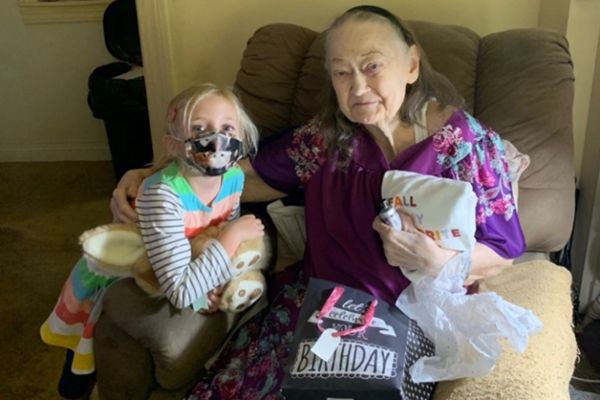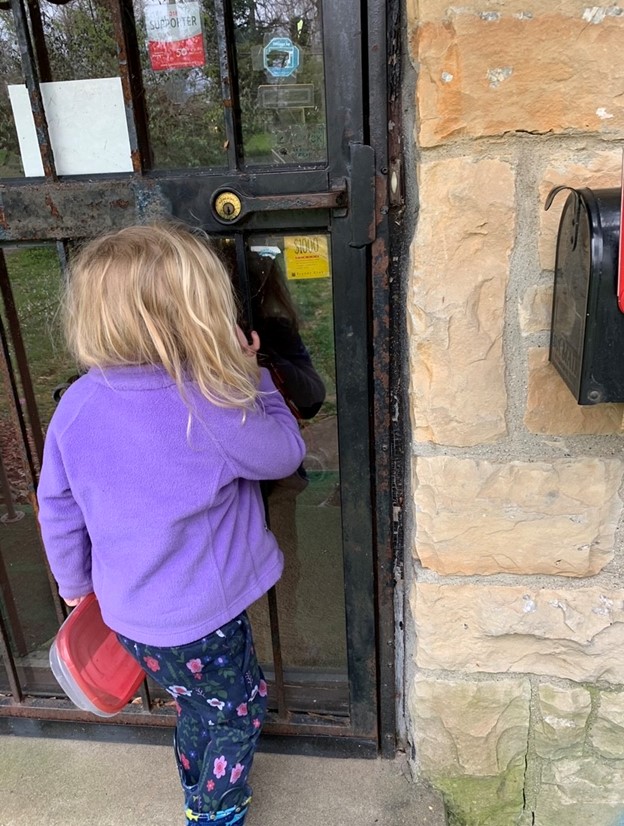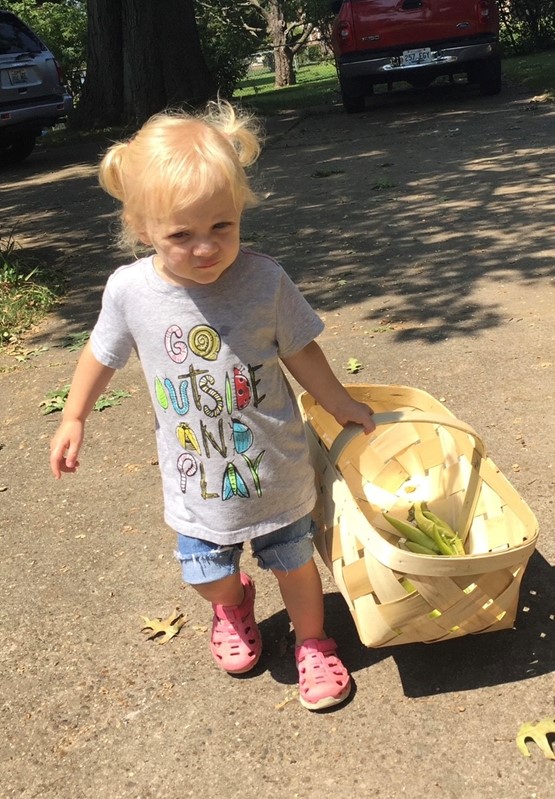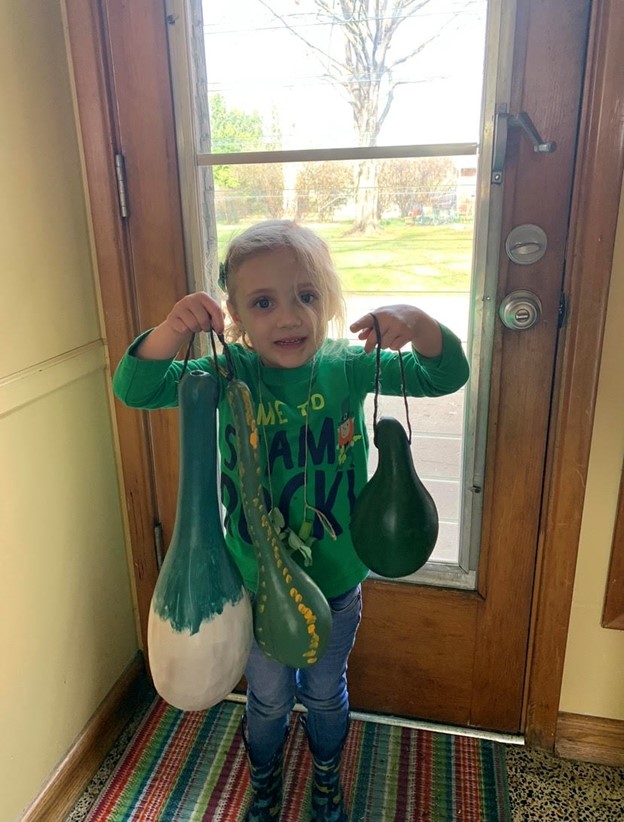거동이 불편한 교우들과 이웃들을 방문하는 일은 아이들이 좋아하는 취미는 아닐 것이다. 하지만 7살의 줄리아 에스크리지(Julia Eskridge)는 두 살 때부터 이 일을 해왔다. 줄리아는 그녀의 어머니와 할머니가 걸었던 길을 따라가고 있다.
“그분들을 만나고 ‘안녕하세요’ 인사하고 이야기를 나누는 일이 좋아요,” 켄터키주 루이빌 제퍼슨타운연합감리교회에 다니는 1학년 줄리아의 말이다. “저는 친구 만드는 것을 좋아해요.”
줄리아는 세대 차이를 넘어 대화하는 것이 별로 어렵지 않은 일이라고 말한다. 예를 들면, 그녀는 86세인 밀드레드 브렉킨리지를 친구로 여기고 특별한 유대감을 가지고 있다. “밀드레드 할머니를 방문하는 것은 너무나 즐거운 일이에요; 정말 좋은 말동무이지요. 우리는 서로의 하루에 대해 물어봐요,” 줄리아가 말했다. “저는 그날 학교에서 있었던 재미난 이야기를 해드려요.” 줄리아는 학교 근처에 사는 밀드레드의 집을 방문하여 대화를 나누고 스위티와 머큐리라는 이름의 고양이들과 놀아주기도 한다.

“줄리아를 만나는 것은 언제나 즐거운 일이지요. 그렇게 어린 친구와 대화할 수 있다는 것이 좋습니다,” 밀드레드가 말했다. “줄리아와 저는 만나자마자 서로에게 미소 짓습니다. 줄리아가 보내는 카드와 사랑스러운 쪽지들은 제게 큰 기쁨입니다 … 나이에 비해 글을 굉장히 잘 씁니다.”
“저 나이에 이렇게 사려 깊은 아이라면, 무엇을 하든지 매우 특별한 존재가 될 겁니다,” 그녀가 말한다. “마치 스펀지처럼 모든 것을 받아들입니다.”
밀드레드는 자신의 어린 시절을 회상한다. 그녀 또한 이웃의 어르신과 특별한 우정을 쌓은 경험이 있었다. “그 할머니는 꽤 흥미로운 분이셨어요. 한 번도 잊은 적이 없습니다. 그네에 앉아 함께 얘기하곤 했어요. 왠지 이 경험이 줄리아와 제 관계에 재현된 것만 같습니다. 어린아이에게 기회가 찾아오면, 무엇이 피어날지 아무도 알 수 없지요.”
줄리아의 엄마인 케이 에스크리지는 인디애나주 베드퍼드에서 자라면서 그녀의 어머니였던 엘리자베스 콜린스와 거동이 불편했던 제일연합감리교회의 교우들을 방문하곤 했다.

거동이 불편한 교우들은 교회 친구들과 교제할 기회를 잃게 된다. 교회를 대신해 그들을 찾아가는 일은 뜻깊은 관계들이 유지되도록 돕는다.
“우리가 주기적으로 방문했던 노인들이 있었어요. 정말 친구처럼 된 분들도 있었습니다. 가장 좋았던 때는 교회에서 이미 알고 있던 분들, 예를 들면 제 주일학교 선생님이었던 분이 거동하지 못하게 되셔서 저희가 그분을 찾아갔던 일이었습니다,” 케이가 기억을 더듬으며 말했다. “제가 사랑했던 분들이고, 이제 제가 그분들을 위해 뭔가 해드릴 수 있다는 사실이 감사했습니다. 제 형제자매들도 이 일을 잘합니다 … 제 고향 교회 분들 중에 이제 집 밖으로 나오지 못하는 분들이나 거동이 불편한 분들이 계세요. 저희 형제들은 고향을 방문할 때면 이분들을 찾아가기도 하고 정기적으로 긴 전화 통화를 하기도 합니다. 저희가 다 이 일을 하는 것은 어머니께서 물려주신 것 때문입니다 … 베드퍼드에 있는 제 고향 교회 식구들은 이전에도 지금도 제 삶에 큰 부분입니다. 저도 줄리아에게 이것을 가르치려 하고요.”
엘리자베스는 교사였고, 여름 방학이 되면 자녀들과 함께 자주 고향을 찾았다. “많은 이들이 자주 만나지 않는 사람들을 잊곤 합니다만, 어머니는 그런 일을 속상해하셨어요,” 케이가 말했다.
“케이가 어렸을 때부터 데리고 다녔습니다,” 엘리자베스가 말했다. “어르신들이 케이를 보고 싶어 하고 그것이 기쁜 일이라는 것을 알았지요 … 줄리아는 사람들을 대하는 기본적인 상냥하고 친절한 태도를 물려받은 것 같습니다.”
엘리자베스는 시간을 내 다른 이들을 위해 사용하는 것을 중요하게 여긴다. “이 세상에는 자녀나 부인이 있든 없든 외로운 사람들이 있습니다,” 그녀가 말했다. “우리는 우리 자신을 그들에게 제공하면서 ‘하나님 사랑합니다’라고 말합니다. 제가 하나님을 사랑하기 때문에 그들을 돌본다는 것을 그들이 알았으면 하고요.”
현재 케이는 켄터키에 있는 그녀의 교회에서 돌봄 사역을 이끈다. 거동이 불편한 이들을 위한 돌봄을 포함하는 사역이다. 생후 6개월 때부터 정원에 나가 있곤 했던 줄리아는 “정원사 소녀”로서 이 사역의 큰 부분을 담당한다. 여름에는 정원에서 기른 채소와 꽃을 꺾어서 엄마와 함께 방문하는 이들에게 가져다준다. 제한된 수입으로는 신선한 야채를 구입할 수 없다고 했던 한 노인의 말에서 착안한 것이었다.

“엄마와 저는 토마토를 많이 기릅니다. 노란색 작은 토마토도 있지요 — 요만한 것들이요,” 줄리아가 크기를 알려주기 위해 손가락을 들며 말했다. “슈거 스냅(껍질채 먹는 완두콩 — 역주)도 기르지만 … 저희가 잘못 키워서 그런지 크기는 크지 않아요. 또 그린빈, 오이 등 상상할 수 있는 것들이 있어요. 올해는 에델바이스, 호박, 등 여러 가지를 더 키워볼 계획이에요. 보통 노란 장미와 붉은 장미도 키웁니다. 로즈힙 차를 만드는 것을 좋아하고요. 아마 그건 1년밖에 안 했던 것 같네요.”
“토마토를 드리면 많은 어르신들이 어렸을 적 토마토를 키웠던 것을 기억하십니다,” 케이가 덧붙였다. “기억의 길을 따라 여행하는 것만 같지요.”

“교회가 거동이 불편해 집에만 계시는 분들을 방문하는 이들과 건강하고 활발한 삶을 사는 이들 모두를 보는 것이 중요하다고 생각합니다,” 그녀가 말했다. “또 어린이들은 다른 세대의 사람들을 만나고 그들의 이야기를 들으면서 너무나 많은 것을 배울 수 있습니다. 저는 아이들에게 좋은 모범을 보이고, ‘저분들은 외로워하고 있고 너희를 필요로한다’고 말해주고 싶습니다. 전화 한 통으로도 그들의 삶에 엄청난 변화를 만들어 낼 수 있습니다.”
줄리아도 동의한다. “어르신들을 방문하고 그들이 친구가 있다는 것을 알게 하는 일은 중요하다고 생각해요,” 그녀가 말했다. “예수님도 분명 그렇게 하셨을 거예요.”
다이앤 데그넌은 테네시주 내슈빌에 거주하며 홍보 전문 프리랜서로 일합니다. 이 기사와 관련된 문의 사항은 로라 뷰캐넌에게 연락하세요.
이 이야기의 영문 기사는 2023년 4월 27일 게시되었습니다.




